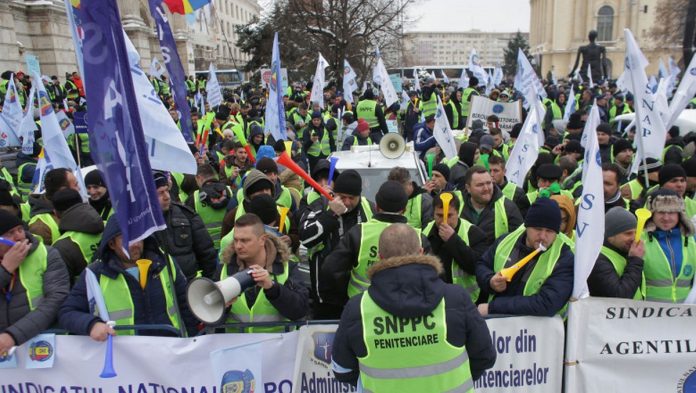The National Union of Police and Contractual Staff (SNPPC) launches street protests on June 6, 7 and 8, possibly even blocking the system, according to a statement sent to AGERPRES on Monday evening, write Agerpres.
„Considering the existing situation in the country generated by the lack of responsibility of the governors, who have produced and maintained an unprecedented legislative collapse; public rumors related to the so-called ‘specialty’ of occupational (military) pensions, precarious salaries in Defense, Public Order and National Security; non-compliance with the legislative framework and the stages of implementation of Law 153/2017, SNPPC will in the first stage trigger protests in the street, then, depending on the evolution of the situation, adopt new reaction and protest measures in order to fulfill the following objectives that leave their mark including on the personnel shortage never seen before in the MAI, when, for the first time, in the schools of police agents, after the stage of knowledge verification, there were 0.57 candidates/place left, on 30.05.2023, and as the medical examinations will begin, they will surely reduce even more the number of candidates remaining in the race,” the SNPPC press release mentions.
Thus, following the consultation of the 74 SNPPC organizations in the country (police, border police and immigration police), the union took the decision to organize trade union movements, having two main claims: the full application of Salary Law 153/2017 for the entire occupational family Defense, Public Order and National Security starting from 01.07.2023 and removal of Law 223/2015 from Romania’s National Recovery and Resilience Plan (PNRR).
„We do not agree with the proposed amendments to Law 223/2015 in the Senate, nor with the new amendments proposed in the Chamber of Deputies,” the unions say.
In a first stage, the SNPPC will organize and carry out protests at the headquarters of the Ministry of Internal Affairs and the Ministry of Labor, on June 6, 7 and 8, 2023, between 11:00 a.m. and 2:00 p.m., to be extended to the Government, the European Commission’s headquarters in Bucharest, and at the Chamber of Deputies.




